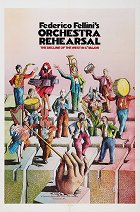Directed by:
Federico FelliniCinematography:
Giuseppe RotunnoComposer:
Nino RotaCast:
Luigi Uzzo, Balduin Baas, Franco Mazzieri, Clara Colosimo, Elizabeth Labi, Sibyl Mostert, Adelaide Aste, Claudio Ciocca, Rolando De SantisVOD (1)
Plots(1)
Using a symphony orchestra as a metaphor for Mankind, Federico Fellini explores the various joys, sorrows, frustrations and triumphs of the musicians. In a Medieval Roman chapel, now an oratorio, an elderly factotum sets up for rehearsal. The musicians arrive, joking and teasing. A union shop steward explains that a TV crew is there, talking to them is optional, and there will be no extra compensation. Musicians talk about their instruments. The German conductor arrives and puts them through their paces. He yells, he insults. The shop steward calls a 20 minute break. The conductor retreats to his dressing room and talks about how the world of music has changed, moving away from respect for the conductor. He returns to the rehearsal to find the orchestra in full revolt. (Cinemax)
(more)Reviews (3)
I understand Federico Fellini more when he reminisces about how the grass was greener in his childhood, a little less so when he dreams or reenacts an unhappy history. But I am farthest from him in this laboratory. Is an allegory still an allegory when it sooner or later stop hiding its double meaning? When the events witnessed don't make sense and the imagined ones only scream at me? A fulfilled stylistic exercise, nothing more. Originally, I wanted to be more reconciled to it because I didn't experience the period in which it was created, but even a few weeks after watching it, Orchestra Rehearsal is still incredibly annoying to me.
()
One of Fellini's best films, which is influenced, among other things, by its very sympathetic length of just 70 minutes, which did not allow the director to fully unleash his creative orgies and dilute the narrative into a series of symbols and decadent imagery. The film is cohesive and easy to understand in its allegory. The symphony orchestra represents modern society and its maturation. Through the reactions of individual musicians, the conductor, and the orchestra's management, the director describes the emergence of a modern state, the loosening of authoritarian regimes, the rise of democracy, and its threat from creeping corruption, all the way to the arrival of the 1968 revolt, which is depicted as a rebellion of musicians against the dominant conductor. Just as the year 1968 ended with the exhaustion of the rebels and a more or less return to the well-worn tracks of state institutions, the revolt against the conductor also ends when external danger appears and the need for authority arises. Overall impression: 95%.
()
Gallery (38)
Photo © RaiTrade


Ads